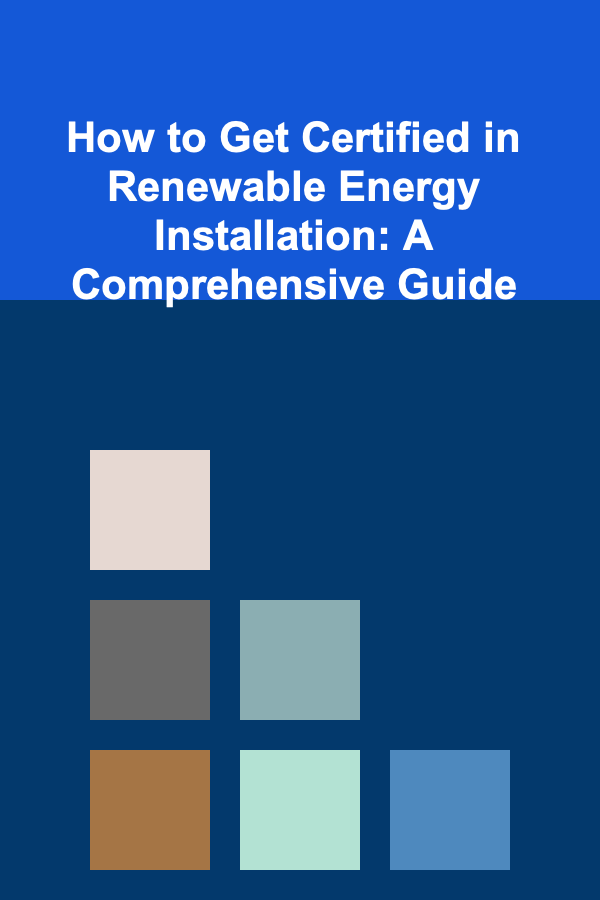
How to Get Certified in Renewable Energy Installation: A Comprehensive Guide
ebook include PDF & Audio bundle (Micro Guide)
$12.99$9.99
Limited Time Offer! Order within the next:

The world is rapidly shifting towards renewable energy sources, driven by environmental concerns, energy security, and economic opportunities. As a result, the demand for skilled professionals in renewable energy installation is booming. Getting certified in this field not only enhances your career prospects but also ensures you possess the necessary knowledge and skills to install and maintain renewable energy systems safely and effectively. This comprehensive guide will walk you through the various aspects of renewable energy installation certification, providing you with the information you need to choose the right path and succeed in this dynamic industry.
Why Get Certified in Renewable Energy Installation?
Investing time and effort in obtaining a renewable energy installation certification offers a multitude of benefits. Here are some of the key advantages:
- Enhanced Career Opportunities: Certification validates your expertise and makes you a more attractive candidate to employers in the renewable energy sector. Many companies prioritize hiring certified installers, as it demonstrates a commitment to quality and professionalism.
- Increased Earning Potential: Certified installers often command higher salaries than their non-certified counterparts. The specialized knowledge and skills acquired through certification allow you to take on more complex projects and contribute more effectively to a company's bottom line.
- Improved Job Security: The renewable energy industry is expected to continue growing rapidly in the coming years. By becoming certified, you position yourself as a valuable asset in a growing field, increasing your job security and long-term career prospects.
- Demonstrated Competence and Credibility: Certification provides independent verification of your knowledge, skills, and experience. This builds trust with clients, employers, and colleagues, enhancing your professional reputation.
- Compliance with Industry Standards: Many jurisdictions require certification for renewable energy installers to ensure compliance with safety regulations and industry best practices. Certification helps you stay up-to-date with the latest codes and standards, protecting yourself, your clients, and the environment.
- Personal and Professional Growth: The process of preparing for and obtaining certification can be a valuable learning experience. It challenges you to deepen your understanding of renewable energy technologies and improve your technical skills.
Types of Renewable Energy Installation Certifications
The renewable energy industry encompasses a wide range of technologies, including solar photovoltaic (PV), solar thermal, wind energy, and geothermal. Consequently, there are various certifications available, each focusing on specific areas of expertise. Choosing the right certification depends on your career goals, interests, and existing skills.
Solar Photovoltaic (PV) Certifications
Solar PV is one of the most rapidly growing renewable energy technologies. Certifications in this area focus on the design, installation, and maintenance of solar PV systems.
- NABCEP PV Installation Professional Certification: The North American Board of Certified Energy Practitioners (NABCEP) PV Installation Professional Certification is widely recognized as the gold standard for solar PV installers in North America. This certification requires extensive experience and a rigorous examination. It demonstrates expertise in all aspects of PV system installation, from site assessment to commissioning. NABCEP also offers certifications for PV Design Specialist, PV Commissioning & Service Provider, and PV System Inspector. These allow individuals to specialize in a particular area of the PV lifecycle.
- ETA International PV Installer Certification: ETA International offers a PV Installer Certification that is another respected option. It focuses on the technical skills and knowledge needed for safe and effective PV installations. While not as universally recognized as NABCEP, it's still a valuable credential.
- State-Specific Certifications and Licenses: Many states have their own licensing and certification requirements for solar installers. These often complement national certifications like NABCEP. Check the specific regulations in your state to ensure compliance.
Solar Thermal Certifications
Solar thermal systems use sunlight to heat water or air for various applications, such as domestic hot water, space heating, and industrial processes.
- NABCEP Solar Heating Installer Certification: NABCEP also offers a certification for Solar Heating Installers. This certification covers the installation and maintenance of solar thermal systems for water heating and space heating. Like the PV certification, it involves experience requirements and a comprehensive exam.
- SRCC Certification: The Solar Rating & Certification Corporation (SRCC) certifies solar thermal equipment and also offers certifications for solar thermal system installers. This certification focuses on the proper installation and maintenance of SRCC-rated systems. While focused on equipment, understanding the installation process is critical for properly certified SRCC equipment.
Wind Energy Certifications
Wind energy is a clean and sustainable source of electricity. Certifications in this area focus on the installation, maintenance, and operation of wind turbines.
- GWWO Basic Safety Training: The Global Wind Organisation (GWO) Basic Safety Training is an essential certification for anyone working in the wind energy industry. It covers safety procedures for working at height, fire awareness, first aid, manual handling, and sea survival. While not specific to installation, it's often a prerequisite for many wind turbine installation jobs.
- AWS Certified Welding Inspector (CWI): For wind turbine construction and repair, certified welders are crucial. The AWS CWI certification demonstrates expertise in welding inspection and ensures quality welds on critical turbine components.
- Manufacturer-Specific Training: Many wind turbine manufacturers offer training programs for their specific turbines. These programs provide in-depth knowledge of the turbine's design, installation, and maintenance procedures.
Geothermal Certifications
Geothermal energy harnesses the Earth's natural heat for heating and cooling applications.
- IGSHPA Geothermal Installer Accreditation: The International Ground Source Heat Pump Association (IGSHPA) offers accreditation for geothermal installers. This accreditation demonstrates competence in the design and installation of geothermal heat pump systems.
- CGD - Certified Geothermal Designer: This certification, also offered through IGSHPA, is for those who design the geothermal systems, ensuring optimal performance and energy efficiency.
Choosing the Right Certification for You
Selecting the most appropriate certification requires careful consideration of your individual circumstances and career aspirations. Here's a step-by-step guide to help you make the right choice:
- Define Your Career Goals: What type of renewable energy do you want to work with? What specific tasks do you want to perform (e.g., installation, design, maintenance)? Answering these questions will help you narrow down your options.
- Research Available Certifications: Explore the different certifications offered in your chosen area of renewable energy. Consider the certification's reputation, requirements, cost, and relevance to your career goals.
- Assess Your Existing Skills and Experience: Evaluate your current knowledge, skills, and experience. Do you have any relevant education, training, or work experience? This will help you determine which certifications you are eligible for and which ones you need to prepare for.
- Consider Local Regulations and Requirements: Check the licensing and certification requirements in your state or region. Some jurisdictions may require specific certifications for renewable energy installers.
- Talk to Professionals in the Field: Reach out to experienced renewable energy installers and ask for their advice. They can provide valuable insights into the different certifications and help you make an informed decision.
- Factor in Cost and Time Commitment: Certifications require both financial investment and time commitment for training and exam preparation. Consider your budget and available time when making your choice.
Steps to Getting Certified
Once you've chosen the right certification, the next step is to prepare for and pass the certification exam. Here's a general overview of the steps involved:
- Meet the Eligibility Requirements: Most certifications have specific eligibility requirements, such as minimum work experience, education, or training. Make sure you meet these requirements before applying for the certification.
- Complete Required Training: Many certifications require you to complete a specific training program or course before you can take the certification exam. These training programs provide you with the necessary knowledge and skills to succeed. Look for accredited training providers that are recognized by the certifying organization.
- Gather Experience: Hands-on experience is crucial for success in renewable energy installation. Seek out opportunities to gain experience through internships, apprenticeships, or entry-level positions. Document your experience carefully, as many certifications require proof of experience.
- Prepare for the Exam: Thorough preparation is essential for passing the certification exam. Utilize study guides, practice exams, and other resources to familiarize yourself with the exam format and content. Consider joining a study group or working with a mentor.
- Apply for and Take the Exam: Once you feel confident in your knowledge and skills, apply for the certification exam. Pay close attention to the exam registration deadlines and requirements. On the day of the exam, arrive early, relax, and focus on answering the questions accurately and thoroughly.
- Maintain Your Certification: Most certifications require you to renew your certification periodically. This typically involves completing continuing education courses or demonstrating continued professional development. Staying up-to-date with the latest technologies and best practices is essential for maintaining your competence and credibility.
Finding Training Programs and Resources
Numerous training programs and resources are available to help you prepare for renewable energy installation certifications. Here are some examples:
- NABCEP Registered Providers: NABCEP maintains a list of registered training providers that offer courses aligned with its certification requirements. These providers offer a variety of training formats, including online courses, in-person workshops, and hands-on labs.
- Community Colleges and Technical Schools: Many community colleges and technical schools offer renewable energy technology programs that can provide you with the foundational knowledge and skills needed for certification.
- Online Learning Platforms: Online learning platforms such as Coursera, Udemy, and edX offer a wide range of renewable energy courses. These courses can be a convenient and affordable way to learn about different renewable energy technologies.
- Industry Associations: Industry associations such as the Solar Energy Industries Association (SEIA), the American Wind Energy Association (AWEA), and the Geothermal Exchange Organization (GEO) offer training programs, conferences, and other resources for renewable energy professionals.
- Manufacturer Training Programs: Many renewable energy equipment manufacturers offer training programs on their specific products. These can be extremely valuable for installers working with particular brands.
The Importance of Continuing Education
The renewable energy industry is constantly evolving, with new technologies and best practices emerging regularly. To stay competitive and maintain your certification, it is essential to engage in continuing education. Continuing education can take many forms, including:
- Attending Industry Conferences and Workshops: Industry conferences and workshops provide opportunities to learn about the latest trends and technologies, network with other professionals, and earn continuing education credits.
- Reading Industry Publications and Journals: Staying up-to-date with the latest research, news, and best practices is essential for maintaining your competence and credibility.
- Taking Online Courses and Webinars: Online courses and webinars offer a convenient and affordable way to learn about specific topics or technologies.
- Participating in Professional Organizations: Joining professional organizations can provide you with access to continuing education resources, networking opportunities, and other benefits.
- Pursuing Advanced Certifications: Consider pursuing advanced certifications to further specialize in a particular area of renewable energy installation.
Overcoming Common Challenges
Getting certified in renewable energy installation can be challenging, but with the right preparation and mindset, you can overcome these obstacles. Here are some common challenges and strategies for addressing them:
- Lack of Experience: Gain experience through internships, apprenticeships, or entry-level positions. Volunteer your time to help with renewable energy projects.
- Financial Constraints: Explore scholarships, grants, and loan programs to help cover the cost of training and certification. Consider starting with a less expensive certification and working your way up.
- Time Commitment: Balance your work, family, and study obligations. Create a study schedule and stick to it. Utilize online learning resources to study at your own pace.
- Exam Anxiety: Practice relaxation techniques to manage exam anxiety. Take practice exams to familiarize yourself with the exam format and content. Seek support from friends, family, or a therapist.
- Keeping Up with Technology: Dedicate time each week to staying up-to-date with the latest renewable energy technologies. Attend industry conferences and workshops. Read industry publications and journals.
Conclusion
Obtaining a certification in renewable energy installation is a significant investment in your future. It demonstrates your commitment to quality, professionalism, and sustainability. By following the steps outlined in this guide, you can choose the right certification, prepare effectively for the exam, and launch a successful career in this exciting and rapidly growing industry. The world needs skilled renewable energy professionals to help build a cleaner and more sustainable future. Your certification can be a key part of that solution.
Disclaimer: This guide provides general information about renewable energy installation certifications. Certification requirements and availability may vary depending on your location and the specific certification you are pursuing. Always consult with the certifying organization for the most up-to-date information.

How to Create a Modern Look in Your Home for Less
Read More
How to Create a Nutrition Station in Your Fitness Area
Read More
How to Stage a Home with Small Budget-Friendly Updates
Read More
How To Sketch Vehicles and Transportation
Read More
How to Avoid Overspending with Credit Cards
Read More
10 Tips for Effective Code Documentation
Read MoreOther Products

How to Create a Modern Look in Your Home for Less
Read More
How to Create a Nutrition Station in Your Fitness Area
Read More
How to Stage a Home with Small Budget-Friendly Updates
Read More
How To Sketch Vehicles and Transportation
Read More
How to Avoid Overspending with Credit Cards
Read More